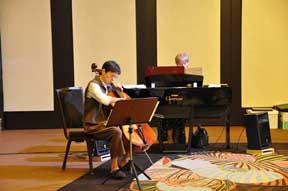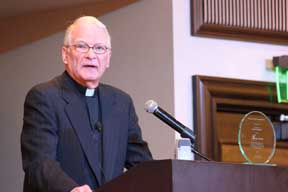The Reverend Jim Jeffery, Rector Emeritus of Trinity Episcopal Church, addressed a crowd of 300 after he received the first annual Vision Award from the Nevada Clergy Association at the 2010 Northern Nevada Prayer Breakfast. His moving address was made more so by the musical accompaniment provided by a duo of Carmelite Sisters, Clorinda de Stockalper OCD on piano and Claire Sokol OCD on cello, performing Debussy’s Reverie, at the climax of his talk. An abbreviated version of his Keynote Address follows:
It was a wonder ful achievement to have this Prayer Breakfast brought back to life after ten years of absence. (In the Christian tradition, resurrection comes three days after death, not ten years, but that’s a story for a different time and place.)
I commend those of you who have made it happen. Scripture says, “without a vision the people perish,” and your vision of our gathering together again helps counter the ignorance and suspicion that is part of today’s climate regarding religion.
A accept with gratitude and humility the first annual Vision Award. In doing so, I pay tribute to many folk, some of whom are in this room, others who have gone to god, who have shared with me a belief in our common humanity while representing a broad spectrum of faith differences.
That I am here in this way is what I call a carrot/stick combination. The carrot: the Award. The stick: that I was also to give this talk!
The Quakers wisely caution, “Don’t speak unless you can improve upon the silence.”
A writer once advised, it’s really very easy to be a writer, all you have to do is sit down at the typewriter (today we’d say computer) and open a vein. I believe the same holds true of speaking.
As I began to bleed in preparation for this talk, I was inspired to ask my Carmelite friends (who pray and who are also musically gifted) to help me and I thank Sisters Cloe and Claire for saying yes.
And I am indebted to my wife who listened many times to what I was composing then in a tactful way would say “it need work.” Bunny, thanks is too small a word.
A few years ago, I head someone say in a downtown Reno setting that for a community t be whole and healthy, it needed four ingredients, all beginning with the letter P. A plaza where people can gather; a pump where water flows; a pub where folk can eat and drink; and a pulpit or religious setting where deep spirituality is witnessed to.
I believe this event comes under the pulpit portion of those ingredients, and perhaps a bit of the pub.
What we do here this morning takes lace in a comfortable setting, but the name of this event, prayer, is not always so comfortable.
Anglican Archbishop Rowan Williams has said that prayer is sometimes “a battle and a struggle.”
In the midst of real life events, be they on a personal plane such as family illness or strife; a community struggling with unemployment and homelessness, or nations engaged in warfare and violence, the bishop writes, “the struggle is not to let God and the world fall apart from each other.”It is separating that I find poet Robert frost protesting:
Something there is that doesn’t love a wall . . .
His neighbor says, ‘Good fences make good neighbors’.
Spring is the mischief in me, and I wonder
If I could put a notion in his head:
‘Why do they make good neighbors? Isn’t it
Where there are cows? But here there are no cows.
Before I was walling in or walling out,
And to whom I was like to give offence.
Something there is that doesn’t love a wall,
That wants it down’. . . .
– “Mending Wall”Instead of being like his neighbor who picks up a stone in each hand, who Frost describes “like an old stone-savage armed” to repair the fence, you and I are called upon to be among those who want the fences down and refuse to allow God and the world to separate from each other.
Hear Rowan Archbishop Williams again: “God and the world belong to each together. There is no place where the love of God can’t go.”This is incredibly hard to accept. But we of the various faith traditions are charged to believe and act upon it.
Within our various religious texts there are examples of what I’m talking about. Situations or times when God’s love is severely questioned. How can God love that much when there seems to be hardly anything worthy or lovable? When the whole world seems caught up in cruelty and pain?
My faith tradition, and I would like to believe other traditions as well, would say that God’s love is there even before there is any hope or light or possibility.
Music is a way that prepares us to consider the possibility.
Our calling is to participate in the costly struggle to hold together God and the world, love and suffering, light and darkness, vision and despair.
I includes verbal prayers for particular persons and conditions, but it also includes times of silence, no asking, no words whatsoever.
The latter is what I believe Archbishop Desmond Tutu meant when he was asked about his prayer life and replied, “It’s no longer a shopping list, but more a sitting by the fire and warming myself.”
Prayer is one way in which our hearts can be opened. It is an alternative against our hearts being closed. It is a never ending process.
Music can help us do that, creating a portal through which we let God’s spirit in.
What Robert Frost calls “Spring Mischief” I call “God’s Spirit” urging us to enter into relationships with others who share the vision of our oneness as human beings, and to celebrate our relationship with the Holy One (called by many names), who made us one and who will not be content until we call each other sister and brother.
This is my vision, and hopefully yours as well.

Carmelite Sisters, Clorinda de Stockalper OCD on piano and Claire Sokol OCD on cello, performing Debussy’s Reverie. PHOTO Stephan Fuelling
(Listen to Rev. James Jeffery’s Keynote Address: HERE.)
Read more on the 2010 Nevada Prayer Breakfast HERE.

